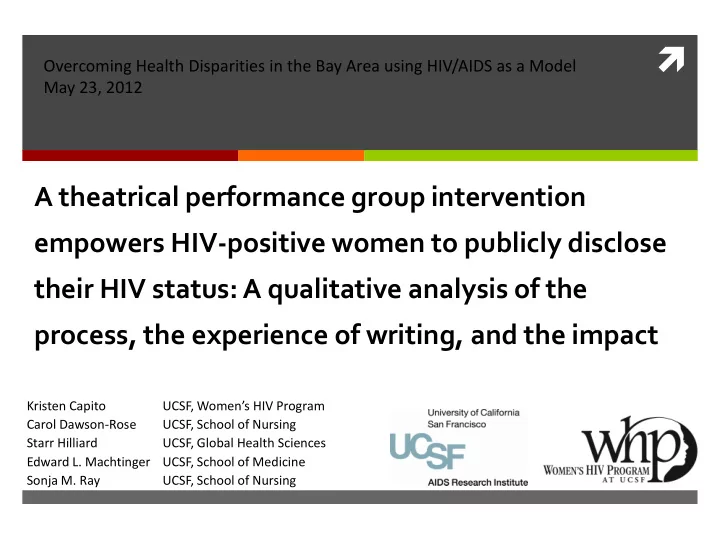

Overcoming Health Disparities in the Bay Area using HIV/AIDS as a Model May 23, 2012 A theatrical performance group intervention empowers HIV-positive women to publicly disclose their HIV status: A qualitative analysis of the process, the experience of writing, and the impact Kristen Capito UCSF, Women’s HIV Program Carol Dawson-Rose UCSF, School of Nursing Starr Hilliard UCSF, Global Health Sciences Edward L. Machtinger UCSF, School of Medicine Sonja M. Ray UCSF, School of Nursing
Introduction and Methods Stigma, isolation, and nondisclosure contribute to poor health outcomes among HIV-positive women Expressive therapy and HIV-disclosure are linked to improved psychological and physiological health outcomes A qualitative study described and evaluated a theatrical performance group intervention
Video Clip – Blood
Participant Demographics HIV status: 8 HIV-positive, 7 HIV-negative Race: 46% African American Age: 23-65 years old (mean = 45, SD = 11.7) Education: all earned a high school diploma Number of years since HIV diagnosis: 1 to 24 years (mean = 13, SD = 8)
Results – Process Formation of Personal Writing Movement Performance Community Transformation The Role of the Leader – The Power to “Show Up”
Results – Experience of Writing Sample Writing Prompts Confronting the How did you find Challenge of Writing out that you have Living with HIV HIV? Private Personal How did you arrive Exploration Identity at this place? What is the Reading the Writing difference between Relationships sex and intimacy? to the Group
Results – Impact Personal Transformation “As cliché as it sounds, it also just emphasized that Developing a Sense of Purpose you're [name], you just happen to be positive. Normalizing HIV You're not positive and your name is [name].” Decreasing Isolation (P11) Forming Relationships
Conclusions
Recommend
More recommend